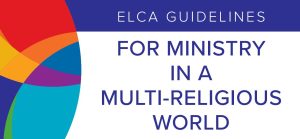by Kathryn M. Lohre
As Lutherans in North America, we have a remarkable opportunity to live out our Christian vocation in a multi-religious world. No matter where we live, the realities of religious diversity are not “out there,” but in our daily lives with our families, in our congregations, communities, and at work. Our ministries – whether as pastors, deacons, or lay people – are shaped by the religious diversity in our midst. The brand new “ELCA Guidelines for Ministry in a Multi-Religious World” provide a way for our ministries to also be shaped for our multi-religious context.
These new guidelines provide both general guidance, as well as recommendations for specific occasions, including prayer services, crisis and tragedy response, social ministries, pastoral care, weddings, funerals, religious rites and ceremonies, and engaging through inter-religious organizations. The guidelines are intentionally not one-size-fits-all templates. Instead, they assert that the foundation for effective inter-religious engagement is authentic relationships coupled with contextual considerations. What you will discover in this document are guideposts for how to weigh factors in light of our shared theological framework and policy commitments for inter-religious relations, consistent with our church’s three inter-religious declarations.*
You can read more about the development of these guidelines in the “Background” and “General Guidelines” sections of the document. Two noteworthy factors in the process were the input gleaned from a survey across the church that yielded the collective wisdom of more than 2,600 respondents, and the review several of our inter-religious partners provided on the penultimate draft. The ELCA is not new to inter-religious relations, and many of our pastors, deacons, and lay people are leading the way in asking bold questions and identifying best practices. The fact that we were able to receive and build upon this collective wisdom richly blessed this work.
Our inter-religious partners are able to hold up a mirror to reflect how they see us. In doing so, they can help us to see more clearly who we want to become, and even how we can continue to grow together. In his review Tarunjit Singh Butalia (Religions for Peace USA) affirmed the guidelines as, “an excellent and well-balanced document [that]…lays out the theological arguments up-front and then delves into the nuts and bolts.”
Other partners acknowledge the value of the document not only for Lutherans, but as a model for their own communities. Rabbi Burton Visotzky (Jewish Theological Seminary) wrote, “I cannot wait for it to be published so that I might share it widely as an example of “best practice” in inter-religious dialogue.” Feryal Salem (American Islamic College) added, “I am inspired to work with Muslim community leaders to think about how we might do something similar.”
We pray that these guidelines will be a blessing to you and to your neighbors of other religions and worldviews. Thank you to all of you who played a role in shaping them, and to all those who will utilize and share them with others.
*These guidelines were called for in “A Declaration of Inter-Religious Commitment: A Policy Statement of the Evangelical Lutheran Church in America” adopted by the Churchwide Assembly in 2019. They are consistent with the inter-religious policy of this church as expressed in “A Declaration of the ELCA to the Jewish Community” (1994), “A Declaration of Inter-Religious Commitment” (2019) and “A Declaration of the ELCA to the Muslim Community” (2022).


